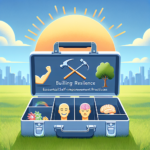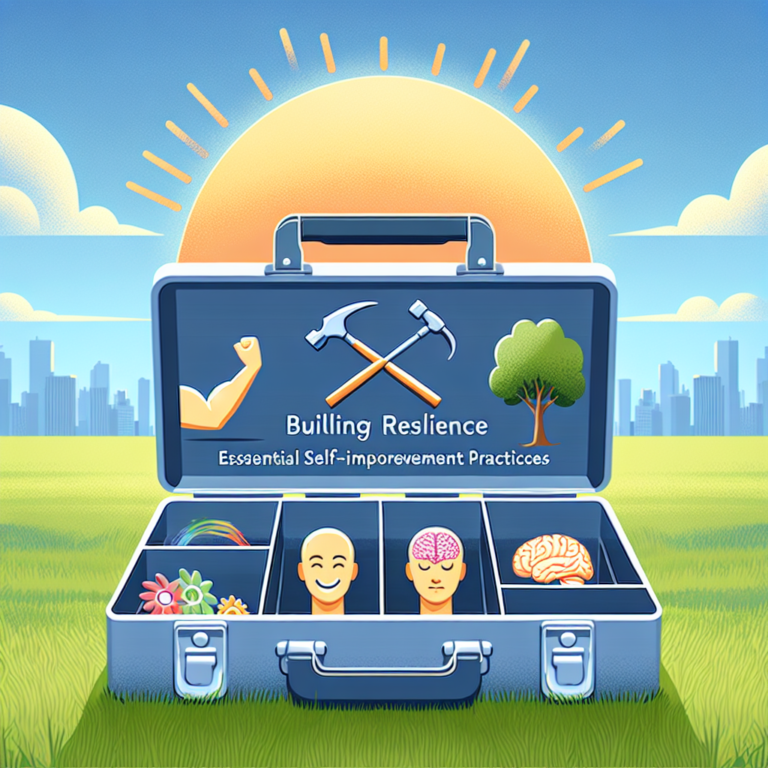
Resilient Minds: The Essential Role of Self-Improvement in Overcoming Adversity
Introduction
In the tumultuous journey of life, adversity is an inevitable companion. It knocks on our doors unexpectedly—be it through personal loss, career setbacks, or mental health challenges. Yet, amidst this chaos, some individuals emerge stronger, their resilience outshining the struggles they face. Resilient Minds: The Essential Role of Self-Improvement in Overcoming Adversity explores this very phenomenon, delving into how self-improvement serves as a vital tool in nurturing resilience and fostering growth.
Consider Thomas Edison, the iconic inventor, who famously said, “I have not failed. I’ve just found 10,000 ways that won’t work.” Edison’s journey was riddled with failures, yet his relentless pursuit of self-improvement transformed his setbacks into stepping stones to brilliance. This article aims to provide insight into a structured approach to resilience through self-improvement while inspiring you to cultivate your own resilient mindset.
The Science of Resilience
Understanding Resilience
Resilience is defined as the ability to bounce back from adversity, trauma, or stress, enabling individuals to regain their footing and thrive despite challenges. Studies in psychology highlight two key factors in fostering resilience:
- Adaptability: The capacity to adjust to new situations and alter responses based on past experiences.
- Social Connections: Establishing strong relationships that provide emotional support during tough times.
By understanding these factors, we can appreciate how self-improvement plays a critical role in building a resilient mindset.
The Psychological Framework
According to Dr. Martin Seligman, founder of Positive Psychology, resilience can be cultivated by developing a growth mindset—the belief that abilities and intelligence can be developed through dedication and hard work. This perspective enables individuals to view failures as opportunities for improvement rather than as insurmountable obstacles.
Case Study: The Resilience of J.K. Rowling
J.K. Rowling, the author of the Harry Potter series, faced numerous rejections before she published her first book. Struggling as a single mother living on welfare, Rowling’s journey epitomizes resilience. Her dedication to honing her craft and belief in her story led to unprecedented success, showcasing the vital link between self-improvement and overcoming adversity.
Building Resilient Minds Through Self-Improvement
Setting SMART Goals
Self-improvement is most effective when guided by clear goals. The SMART criteria—Specific, Measurable, Achievable, Relevant, and Time-bound—enhances focus and direction.
| SMART Criteria | Description |
|---|---|
| Specific | Define clear objectives |
| Measurable | Use metrics to track progress |
| Achievable | Set realistic goals |
| Relevant | Ensure alignment with personal values |
| Time-bound | Establish deadlines for accountability |
By setting SMART goals, individuals can channel their energies effectively, transforming challenges into achievable milestones.
Cultivating Emotional Intelligence
Emotional intelligence (EI) is pivotal in self-improvement, allowing individuals to understand and manage their emotions and those of others. EI comprises:
- Self-awareness: Recognizing emotions and triggers.
- Self-regulation: Managing impulses and staying calm under pressure.
- Motivation: Harnessing emotions to pursue goals.
- Empathy: Understanding and addressing the needs of others.
- Social Skills: Building stronger relationships for support.
Case Study: The Rise of Oprah Winfrey
Oprah Winfrey’s story resonates with millions. Overcoming a traumatic childhood marked by poverty and abuse, she cultivated emotional intelligence and resilience through self-improvement practices. Winfrey emphasizes learning from experiences, cultivating optimism, and embracing self-care as essential for overcoming life’s hurdles.
Practicing Mindfulness and Stress Management
Mindfulness practices, such as meditation and deep-breathing exercises, can significantly enhance resilience. Studies demonstrate that mindfulness reduces stress, promotes emotional regulation, and increases focus.
Techniques for Mindfulness:
- Meditation: Allocating time each day to meditate can improve awareness and reduce anxiety.
- Journaling: Keeping a daily journal helps process emotions and thoughts, allowing for greater clarity and understanding.
Case Study: The Transformative Power of Mindfulness
A landmark study conducted by researchers at Harvard University revealed that mindfulness meditation not only reduces stress but also creates structural changes in the brain. Participants who engaged in an 8-week mindfulness program showed increased gray matter density in regions associated with memory, sense of self, empathy, and stress regulation.
Taking Action: Practical Steps to Develop a Resilient Mind
Create a Support Network
One of the most effective strategies in self-improvement is building a supportive network. Surrounding yourself with positive influences, be it friends, mentors, or support groups, encourages resilience.
Embrace Continuous Learning
Life is a continuous journey of learning. Engage in new experiences, seek knowledge, and welcome challenges. Taking courses, reading books, or attending workshops fosters a growth mindset crucial for resilience.
Seek Professional Help if Needed
Sometimes, professional intervention is necessary. Therapists and counselors can provide valuable insights, coping strategies, and support in overcoming difficult situations.
Develop a Positive Self-Dialogue
The conversations we have with ourselves can shape our mindset. Practice positive affirmations and challenge negative thoughts. Remind yourself of past successes and abilities, reinforcing belief in your capacity to overcome adversity.
Reflect and Reassess Goals Regularly
Resilience is not a one-time achievement; it requires continuous efforts. Regularly reassess goals and reflect on progress. Celebrate achievements, no matter how small, to maintain motivation and perspective.
The Role of Failure in Self-Improvement
Embracing Failure as a Learning Opportunity
Failures often stand as formidable obstacles in one’s path. However, they also serve as the greatest teachers. Adopting a resilient mindset allows individuals to reframe failure as a stepping stone rather than a stumbling block. The key insight here is understanding that failure is not a reflection of your worth or capability.
Case Study: The Resilience of Steve Jobs
Steve Jobs faced significant failures throughout his career, including being ousted from Apple, the company he co-founded. Rather than conceding defeat, he used that setback as an opportunity for reflection and growth, which later led to innovative creations like the iPhone and iPad. His story exemplifies how embracing failure can propel individuals towards greater success.
Conclusion
The journey towards resilience is not always a linear path, but it is undoubtedly a rewarding one. Resilient Minds: The Essential Role of Self-Improvement in Overcoming Adversity illustrates how adopting a proactive approach to self-improvement can help us navigate life’s challenges effectively. Through goal-setting, cultivating emotional intelligence, practicing mindfulness, and embracing failure, we can develop sturdy foundations against adversity.
As you embark on your resilience-building journey, remember that every small effort counts. Continuously strive for personal growth, seek support, and, most importantly, believe in your inherent strength to overcome adversity. The challenges you face today can lay the groundwork for the resilient mind you cultivate tomorrow.
FAQs
1. What is resilience?
Resilience is the ability to recover and adapt from adversity, stress, or trauma, enabling individuals to maintain their mental well-being despite challenges.
2. How can self-improvement help in building resilience?
Self-improvement fosters skills and strategies, such as emotional intelligence, adaptability, and a growth mindset, all crucial for navigating adversity effectively.
3. What techniques can enhance emotional intelligence?
Techniques like active listening, empathy exercises, self-reflection, and mindfulness practice can enhance emotional intelligence and resilience.
4. Why is failure important in the journey of self-improvement?
Failure provides valuable lessons and insights, allowing individuals to reflect, adapt, and ultimately grow stronger in the face of challenges.
5. How can I start my journey towards self-improvement?
Begin by setting SMART goals, cultivating emotional intelligence, surrounding yourself with a supportive network, and embracing experiences that encourage growth. Engaging with resources such as books, podcasts, or courses can also foster self-improvement.
With these insights in hand, you are poised to embark on your own journey of resilience and self-improvement. Embrace the challenges ahead, for they may just be the catalysts for your most profound growth.

















